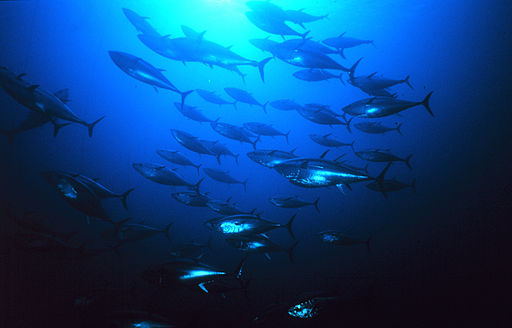Mediterranean Fish Susceptible to Climate Change
European freshwater fish will be strongly affected by climate change. A new study has shown that species from the Mediterranean region are at high risk, with fish from extreme habitats characterised by heat and drought particularly vulnerable.
 Image: By Danilo Cedrone (United Nations Food and Agriculture Organization) (http://www.photolib.noaa.gov/htmls/fish2001.htm) [Public domain], via Wikimedia Commons
Image: By Danilo Cedrone (United Nations Food and Agriculture Organization) (http://www.photolib.noaa.gov/htmls/fish2001.htm) [Public domain], via Wikimedia Commons
Climate change will strongly affect many European freshwater fish species. This is particularly the case for species in the Mediterranean region, according to the latest findings of an international team of researchers from institutions including the Czech Academy of Sciences, the University of Girona in Spain, the Norwegian Research Centre, and the Leibniz‐Institute of Freshwater Ecology and Inland Fisheries.
Many fish species are threatened globally by development and overfishing. Climate change is an emerging threat and it is understood that this will have negative impacts on many species. Freshwater fish species face particular challenges: dry inland waters, fluctuating water levels and, above all, rising water temperatures will affect numerous species in the future – fish stocks will decline and more species of fish will become extinct. According to the IUCN Red List of Threatened Species, around one-third of freshwater fish species are vulnerable to the impacts of climate change. Consequently, freshwater fish are among the world’s most at-risk species.
A new study, published in Global Change Biology, investigated which species traits influence sensitivity to climate change. “It will not be possible to avert the looming crisis in freshwaters by introducing a catch quota. Management initiatives and programmes to protect European fish stocks must take into account future changes in habitat conditions. In light of this, it is important to identify regions and species that will be most impacted by climate change,” stated Ivan Jaric, lead author of the study from the Czech Academy of Sciences, explaining the team’s research approach.
For the study, a total of 443 European freshwater fish species were analysed with regard to their susceptibility to future climate change. The team used these data to compile a list of particularly vulnerable fish species. According to their list, European species that occur in the Mediterranean region are particularly susceptible to climate change. Fish from extreme habitats that are characterised by heat and drought exhibit particular vulnerability under even more extreme environmental conditions. Most of the ‘top ten’ vulnerable European freshwater fish species are from Greece, others are from Spain or Portugal.
What is more, most fish that are particularly vulnerable to climate change are characterised by a low commercial and fishing significance. “The species most susceptible often have a smaller body size, they are rare species with a small distribution area, and are therefore not necessarily of direct economic relevance. And yet they sometimes play an important role in food webs and ecosystems. I would like to see management measures focusing not only on fisheries, but also on conserving communities and the complex services they provide to nature and humans,” said Gregor Kalinkat, one of the co-authors of the study.
The results of the study are a clear indication that measures for protecting European fish species vulnerable to climate change should concentrate in particular on the Mediterranean region.





Sorry, comments are closed on this post